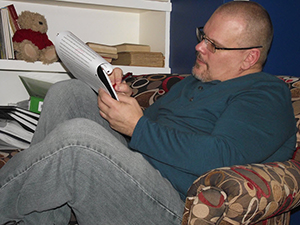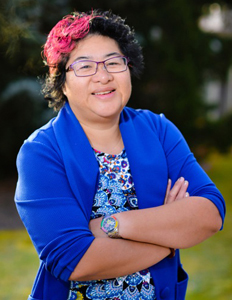To Humanize Drag: Dale Lee Kwong in Conversation with Neal Debreceni

Charles Lillard Founders' Award 2019 judge Dale Lee Kwong talks with Neal Debreceni, winner of the 2019 Charles Lillard Founders' Award for Creative Nonfiction for "Life in the Fab Lane," which appeared in the Queer Perspectives Issue #205.
Read what judge Dale Lee Kwong had to say about "Life in the Fab Lane" on the 2019 Charles Lillard Founders' Award announcement page.
Congratulations on winning the [Charles Lillard] Founders' Award for Life in the Fab Lane. When did you first “come out of the closet” as a writer?
Thanks, Dale. And thank you for your thought-provoking questions. You’re going to put this poor little introvert THROUGH IT!
The use of the “closet” terminology truly feels appropriate in terms of my journey as an author. Writing has always been a central part of my life; however, owning the identity of “author” is something I’ve shied away from. That image of the lonely writer, locked in a dark garret, slaving away at the keyboard, writing the great Canadian whatever that no one is ever going to read? That’s practically my selfie. I have always lacked confidence in my writing, not so much in terms of doubting my ability to string words together, but by questioning whether I had anything meaningful to say that would engage readers. As a result, I’ve kept that part of my life very private, rarely—if ever—sharing it with friends or family. Life in the Fab Lane is only the second piece I’ve submitted for publication, and the first published. I guess you could consider this piece, and this shockingly unexpected award, as my coming-out party.
Why did you choose drag performance as a topic for Queer Perspectives?
Fab Lane was created for a writing course three years ago. I had been mired in the world of academic writing for a couple years, and needed an outlet for my creative energies. I enjoy writing classes because they give me the structure and deadlines I need to work, while providing a safe environment to experiment. I wasn’t very familiar with creative nonfiction, but one of the readings for the class, Marcello Di Cintio’s Fatherhood, truly inspired me to dip my toes into the pool. My mentor in the class, Vivian Hansen, was very supportive of my decision.
Education and entertainment have always been central to my identity, and I believe that people learn best when these elements are combined. I tried to create a synergy between the two in Fab Lane. My hope was that the reader would enjoy my story, yet walk away from it with beliefs challenged, and perspectives expanded.
Did the piece accomplish whatever goals you had for it?
Drag felt like an appropriate topic to discuss at this moment in time because I feel that there is an interesting shift happening in how it is perceived within our culture. Undeniably, there is a massive surge in the popularity and acceptance of drag as an art form happening right now. However, despite this renaissance, the portrayal of drag in entertainment seems to be moving backwards. Gone are the days of Torch Song Trilogy, Priscilla, Queen of the Desert, and Too Wong Foo, which presented drag performers as fully developed characters with rich emotional lives. Instead, in my opinion, drag characters are being pushed into the background—supporting characters who either show up to be the dispensers of wisdom or providers of comic relief, and then are banished. This dichotomy between popularity and presentation intrigues me. I wanted to humanize drag—to show the character painted on the surface, but remind the reader that behind all the glitz and glamour lies a real person, with all the same issues and insecurities anyone else has.
What genres do you typically write, and what were the biggest challenges or epiphanies you had writing Creative Non-Fiction for this piece?
I consider myself to be primarily a writer of gay fiction. Most of my writing has been short fiction; however, I have dabbled in playwriting, and am currently revising my first novel.
As an introvert, I tend to be very guarded about how much of myself I share with people. This has shaded my writing, because when you surround yourself with walls, it tends to limit your ability to make emotional connections. I think that before Fab Lane, those emotional barriers were reflected in my writing. I skimmed the surface of emotional truth, but never seemed to get to the core of it.
When writing Fab Lane, I set a challenge for myself to be vulnerable and honest with the telling of T’Wanda’s story. I took notice of the moments when I thought, “I don’t want to go there” and forced myself to look at why I felt that way. Frequently, it was because the writing was chipping away at some of my walls and I was trying to keep them intact. Finding those moments—confronting myself and working through them—was incredibly cathartic for me. It’s also been very freeing. I think my work since then has had more emotional depth to it because I am more willing to be vulnerable, and put it all out there so the reader can connect with me.
What does T’Wanda DeWitt think about the publication and positive reception to Life in the Fab Lane?
As I said, writing this was very cathartic for me. Seeing it published, however, gave me a sense of closure that I don’t think I even knew I was seeking. It has put a bow on the whole T’Wanda experience in a very satisfying way. And it’s allowed me to clean out some closets—both the figurative and literal kind. But that’s my perspective. . .
Does T’Wanda yearn to be performing anytime soon?
T’Wanda is LIVING for the fact that she has gained literary immortality. Publication of her story has given her a sense that her ethereal existence now has a solidity and permanence that it never had when she was performing. Memories fade, videos and photos get deleted. Words on the printed page, though? They will always survive. It would appear that T’Wanda is content right now. She’s enjoying her moment in the sun, but isn’t planning a return engagement any time soon.
If your writing practice were a drag queen, what would her name be?
Such a great question, and it just screams for a witty answer. Oy! I find it difficult to sum up my writing practice in one pithy phrase. “Verbose” is a word I would use, but it’s not lending itself to a pun for me. Instead of coming up with one name to describe my writing practice, here’s a list of names that could apply (with apologies to any queen whose name I may have stolen): Ms. Conceived, Alma Doubts, Anita Agent (no, really. . .), Bea Leave, Dee Scribe, Dela Tory, Edie O’Matic, Ida Claire, Rhee Dabook, Emma Wordsmith, Elle O’Quent. And, because cheesy puns aren’t just for queens: Artie Culate, Lee Rickle, Rhet Oracle.
Tell us about your writing practice.
I do my best writing in the shower. Seriously. Everything is written in my mind before I sit down at the computer. Because the story is basically complete in my brain, the physical writing process is more like transcribing, with words flowing quickly onto the screen. Somehow, I manage to maintain a critical eye through this process, allowing me to do a certain amount of editing at the same time, giving me a relatively polished first draft. The downside of this process is that I find free writing incredibly difficult, so if I’m blocked, I’m deeply blocked. My biggest challenge is that I am a huge procrastinator, so I need firm deadlines to keep me in check. Fortunately, there’s just something about the pressure of an impending deadline that brings out the best in my writing.
What has been inspiring you creatively lately?
My biggest influence as a writer has always been Armistead Maupin. I go back to his books time and time again whenever I need to feel inspired. His Tales of the City series does an amazing job of telling big, complex stories while focusing on the little details that build a life. I love the way he tells stories with deep emotional resonance while making us laugh. And I am in awe of the way he weaves in the details that anchor his stories in a specific time and place. I’m looking forward to seeing the new Tales of the City television series this summer.
What’s next for your Life in the Fab Lane, and are you working on anything you’d like to mention?
I took a bit of a break from creative writing to finish my Master’s degree, because, stylistically, I find it hard to move back and forth between the richness of creative writing and the sparseness of academic writing. But the Master’s is complete and now it’s time to get those creative juices flowing again.
I have two projects on the go: a novel, and a Christmas-themed short story. Both stories are romances exploring the relationships between hot, hunky men, and the men who want to love them.

Dale Lee Kwong
* * * * * * * *









